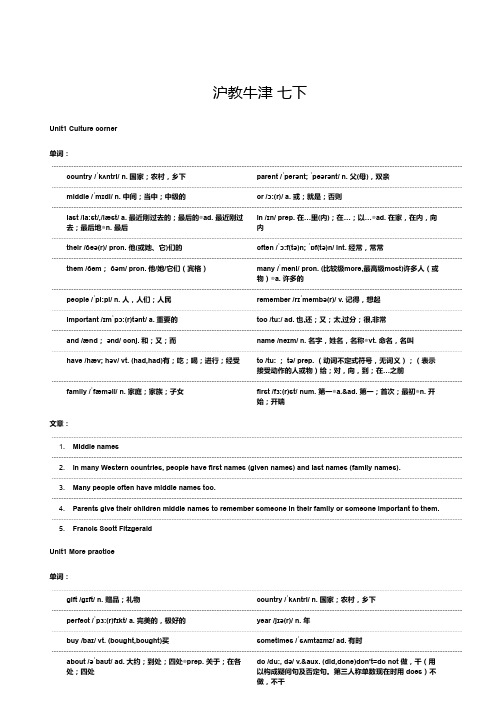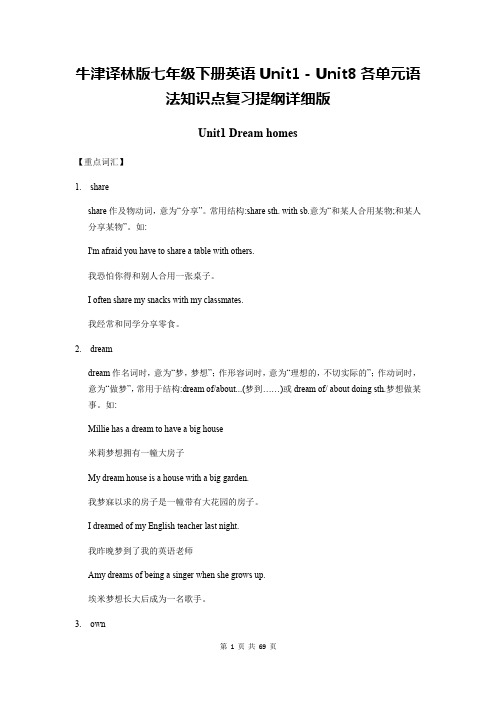牛津英语七年级下册知识点.doc
Unit 2 知识点梳理-牛津译林版七年级英语下册

牛津译林版七下Unit 2 知识点梳理1.Where are you going?你要去哪儿?现在进行时表将来。
现在进行时可用于表示计划或安排将要发生的动作,go,come,leave等表示位移的动词,都可以用现在进行时表示将来。
2.I’m going to visit our new neighbours. 我打算去拜访我们的新邻居。
neighbour “附近的人或物”(侧重指人)neighbourhood “邻近街区,居民区”(侧重指地方)3.I’m afraid they won’t welcome visitors like you. 恐怕他们不会欢迎像你这样的客人。
I’m afraid + (that) 从句. “恐怕……”,常有“抱歉”之意。
I’m afraid not.(恐怕不是)I’m afraid so.(恐怕如此)be afraid to do sth.“害怕/不敢去做某事”be afraid of sb./sth.“害怕某人/某物”be afraid of doing sth. “害怕/担心做某事”be afraid for “为……担心”visitor:n. “访问者,参观者”动词加-er或-or变成名词,表示从事该职业的人。
like:prep. “像……一样,相似”。
反义:unlikelook like “看起来像”;be like “像”辨析:like/aslike:强调“如同……一样,如……一般”。
用于相似关系,即两者在形态上或者性质上有相似之处,但并不等同。
as:表示“以……的身份;作为”。
用于说明同一关系,即两者实为一体。
作动词,“喜欢”。
like doing sth.“喜欢做某事”。
4.How many buildings are there in your neighbourhood? 在你的居民区里有多少幢楼?how相关短语:how much:“多少”,提问物品价格或不可数名词。
牛津译林版七年级下英语知识点总结

牛津译林版七年级下英语知识点总结1."Would you like to do something?"Positive answer: "Yes。
I'd/we'd like/love to."Negative answer: "I'd/we'd like/love to。
but。
" or "Sorry。
I'm/We're afraid not."2."Next to" means near or beside.3."One" refers to any one of the same type of thing ned earlier。
"It" refers to the same thing ned earlier.4."Be from" means to come from.5."The capital of" refers to the capital or provincial capital ofa place.6."Around the world," "in the world," and "all over the world" all mean globally.7."Enjoy oneself," "have a good time," and "have fun doing something" all mean to have a good experience doing something.8."In the centre of" means in the middle of.9."Share something with someone" means to use or enjoy something together.10."Look out" means to look outside。
牛津英语七年级下知识点

1.语法知识点:-一般现在时:主语+动词原形-一般过去时:主语+动词过去式- 现在进行时:主语+be动词+动词-ing形式- 一般将来时:主语+will+动词原形- 情态动词can、must、may等的用法-疑问句的组成:疑问词+一般疑问句/否定疑问句/选择疑问句-祈使句的用法:动词原形+其他- 被动语态:be动词(各种时态)+过去分词- there be句型:there be+物/人(不论单复数),表示地有物/人-名词所有格与物主代词的用法-副词的用法:一般在动词或形容词之后修饰它们- 连词的用法:and、but、so、because等的使用-定冠词与不定冠词的用法-数词的用法:基数词与序数词的使用2.词汇知识点:七年级下册词汇主要涵盖以下几个主题:-单词分类:人,动物,自然,城市,交通工具,菜肴,学科,职业等-数字、颜色、天气、季节等基本词汇-日常生活词汇:家庭、日常活动、购物、饮食、运动等-学校及学习用品词汇-描述性词汇:人物特征,衣服,感受等-游戏、音乐、戏剧等娱乐活动相关词汇-旅游、度假及参观相关词汇-时间与日期词汇3.对话与口语表达能力:七年级下册的对话主要涵盖日常生活、学校、购物、运动、假期、饮食等方面的交际场景。
学生需要学会简单的自我介绍、问候、表达个人爱好及偏好、提问、回答等基本口语表达方式。
同时,也需要学会根据所学语法知识构造简单的对话,实现对话的连贯性与合理性。
4.阅读理解与写作:七年级下册的阅读理解主要包括对短文的理解、回答问题、判断正误、填空等题型。
题材主题多样化,如校园生活,外出旅游,各种活动等。
学生需要通过阅读理解提升自己的阅读能力,扩大词汇量,提高对句子结构和上下文的理解能力。
同时,写作部分要求学生能够根据给出的题目和提示,用正确的语法和词汇结构写一篇不少于80词的短文。
以上是牛津英语七年级下册的主要知识点,通过对这些知识点的系统学习和灵活运用,学生能够基本掌握英语的基础知识,提高对英语的理解和运用能力。
Unit 2 知识点牛津上海版英语七年级下册

Unit Two 语法小结Name: Class:1. robber [C] n. 强盗[联想] thief (thieves) n. 贼,小偷rob v. 抢劫(robbed, robbed) robbery [C] n. 抢劫案The ________________ happened at 2 a.m. The old man saw two _____________ break into the bank. They _____________ two bags of money.steal v. 偷(stole, stolen)steal sth. from sb. 从某人处偷rob sb. of sth.抢某人某物他偷/抢了我的钱包____________________________________________________________2. hate v. 讨厌,不喜欢hate to do = hate doingdislike v. dislike to do = dislike doing sth.我讨厌和刻薄的人交朋友。
Ihate__________________________________________我讨厌看恐怖电影Idislike_______________________________________________3. adventure [C] 冒险,奇遇All the children listened to his adventures with full attention.adventurer n. 冒险家adventurous a. 冒险的4. in space 在太空in the space 在……的空间里There are many different kinds of stars in_______ space.We can put nothing in_______ space between the two desks.5. full of laughter and fun 充满笑声和欢乐laughter [U] laugh v. ______________ 嘲笑某人be full of = be filled with 充满这部警匪片充满了欢笑(2种)____________________________________.6. miss v. 错过,想念Hurry up, ________________________________ (否则你就要错过早班车了) =If ________________________________________________我很想念母亲_______________________________________7. in a small town far away 在一个遥远的小镇上far away在这里是一个副词短语,置于句末Christmas is a time for friends to send cards to those who live far away.崇明岛离市中心很远_______________________________________8. pay v. (paid, paid)sb. pay money for sth. / sth. cost sb. money / sb. spend money on sth. 付钱用spend, pay, cost填空I have to_________ them 20 pounds for this room each month.They _________ much time writing the report yesterday.This pair of shoes __________ me only 100 yuan.Would you please __________ for my dinner?pay for his carelessness 为他的粗心付出代价pay attention to sb/sth 注意某人/某物pay off 得到回报His hard work paid off.9. altogether adv. 总共,一共altogether = in all=totally车上一共有30人_________________________________________________________ _________________________________10. the way to the cinema 去电影院的路the answer _______ the question the key ______ the door the entrance________ the building11. avenue, street, road, lane, driveavenue通常指两边有树的,通往较大建筑的大街。
上海牛津英语七年级下册U7知识点总结

上海牛津英语七年级下第七单元知识总结授课内容Word forms1. able adj.有能力的,能够的unable adj.不能的,不会的enable vt. 使能够ability n.能力I am afraid I won't be able to visit you on Saturday.A little baby is unable to walk or talk.The new law has enabled more women to return to work.A person of his ability will have no difficulty getting a job.2. hope n../v.希望,期望hopeful adj. hopeless adj.不抱希望的,不给人希望的You're my only hope. Please help me.I hope that you feel better soon.This is a hopeful news.He is hopeless about his chances of winning the contest.3. secret n.秘密secret adj.秘密的;保密的secretly adv.秘密地secretary n.秘书I can’t tell you where we’re going –it’s a secret.He escaped through a secret door.The boy slipped out of the room and headed for the swimming pool secretly.The secretary must take the minutes of the meetings.4.sign v.签(名);签字*signature n.签名;签字I saw him making signs at us.These two signatures are very similar, can you tell them apart?Phrases1.talk about 谈论2.enter a new century 进入一个新世纪3.in the future 在将来4.be able to do sth. 能够做某事5.live on other planets 住在其他的星球上6.enough food for everybody 供给每个人的足够的食物7.grow vegetables 种蔬菜8.in space stations 在宇宙空间站9.people in different countries 不同国家的人们10.speak the same language 说同一种语言11.understand each other better 彼此更加了解12.live in the cities under the sea 住在海底城市13.learn form computers 通过电脑来学习14.take pills for meals 服药片代替吃饭15.travel to other planets in spacecraft 乘宇宙飞船去别的行星旅行16.in people’s homes 在人们的家中17.terrible air pollution 严重的大气污染18.in ten years’ time = in ten years在十年以后19.keep sth. in a secret place 把某物存放在一个秘密的地方20.write down … on … 在……上写下……21.pieces of paper 一张张的纸22.put … in … 把……放在……里23.seal sth. with tape 用胶带密封某物24.pollute the earth 污染地球25.become an astronaut 成为一个宇航员Sentences1. What do you think will happen in the future? 你们认为将来会发生什么?2.Perhaps people will be able to do sth. 可能人们将能够做某事。
沪教牛津 初中 英语 七年级下册(七下)

country/ˈkʌntri/n. 国家;农村,乡下parent/ˈperənt; ˈpeərənt/ n. 父(母),双亲middle/ˈmɪdl/n. 中间;当中;中级的or/ɔ:(r)/a. 或;就是;否则last/la:st/,/læst/a. 最近刚过去的;最后的◎ad. 最近刚过去;最后地◎n. 最后in/ɪn/prep. 在…里(内);在…;以…◎ad. 在家,在内,向内their/ðeə(r)/pron. 他(或她、它)们的often/ˈɔ:f(tə)n; ˈɒf(tə)n/int. 经常,常常them/ðem; ðəm/pron. 他/她/它们(宾格)many/ˈmeni/ pron. (比较级more,最高级most)许多人(或物)◎a. 许多的people/ˈpi:pl/ n. 人,人们;人民remember/rɪˈmembə(r)/v. 记得,想起important/ɪmˈpɔ:(r)tənt/a. 重要的too/tu:/ad. 也,还;又;太,过分;很,非常and/ænd; ənd/conj. 和;又;而name/neɪm/n. 名字,姓名,名称◎vt. 命名,名叫have/hæv; həv/vt. (had,had)有;吃;喝;进行;经受to/tu: ; tə/prep. (动词不定式符号,无词义);(表示接受动作的人或物)给;对,向,到;在…之前family/ˈfæməli/ n. 家庭;家族;子女first/fɜ:(r)st/num. 第一◎a.&ad. 第一;首次;最初◎n. 开始;开端gift/gɪft/n. 赠品;礼物country/ˈkʌntri/n. 国家;农村,乡下perfect/ˈpɜ:(r)fɪkt/a. 完美的,极好的year/jɪə(r)/n. 年buy/baɪ/vt. (bought,bought)买sometimes/ˈsʌmtaɪmz/ ad. 有时about/əˈbaʊt/ad. 大约;到处;四处◎prep. 关于;在各处;四处do/du:, də/v.&aux. (did,done)don't=do not 做,干(用以构成疑问句及否定句。
牛津译林版七年级下册英语Unit1-Unit8各单元语法知识点复习提纲详细版(全面,实用!)

牛津译林版七年级下册英语Unit1-Unit8各单元语法知识点复习提纲详细版Unit1 Dream homes【重点词汇】1. shareshare作及物动词,意为“分享”。
常用结构:share sth. with sb.意为“和某人合用某物;和某人分享某物”。
如:I'm afraid you have to share a table with others.我恐怕你得和别人合用一张桌子。
I often share my snacks with my classmates.我经常和同学分享零食。
2. dreamdream作名词时,意为“梦,梦想”;作形容词时,意为“理想的,不切实际的”;作动词时,意为“做梦”,常用于结构:dream of/about...(梦到……)或dream of/ about doing sth.梦想做某事。
如:Millie has a dream to have a big house米莉梦想拥有一幢大房子My dream house is a house with a big garden.我梦寐以求的房子是一幢带有大花园的房子。
I dreamed of my English teacher last night.我昨晚梦到了我的英语老师Amy dreams of being a singer when she grows up.埃米梦想长大后成为一名歌手。
3. ownown作形容词.意为“自己的,属于自己的”,常和形容词性物主代词连用,构成短语of one's own,表示“属于某人自己的”,on one's own = alone,意为“独自地”。
own作动词时,表示“拥有”。
如:I have my own computer我有属于我自己的电脑。
That's a car of her own.那是她自己的汽车。
He lives on his own.他一个人生活。
七年级英语下册 知识点总结 牛津上海版

七年级英语下册知识点总结牛津上海版Module 1 Garden City and its neighbours1. How are you getting on with your travel guide?get on with ―发展‖; ―与……相处(融洽)‖I’m getting on well with the preparation.How are you getting on with your new classmates?2. be famous for… (以/由于…… 出名)be (well) known as…(以/ 作为… .被人知晓)Shanghai is famous for its night views.Shanghai is also known as a ―Shopping Paradise‖ because there are a lot ofdepartment stores and huge shopping centres.上海被誉为―购物天堂‖,因为上海有不少百货商店和大型购物中心。
Qingpu is famous for its fish and rice.3. It is + adj. + that (主语从句), 表示― ……太…… 了‖It is wonderful that we can have dinner on the 91st floor in Shanghai World Financial Centre.It is not surprising that many tourists come to visit Shanghai every year toshop.It is + adj. + to do s.th.It is convenient to travel between Pudong and Puxi.=To travel between Pudong and Puxi is convenient.It is terrible to have dinner in this restaurant. The food tastes awful.=To have dinner in this restaurant is terrible.4. If you go there, you will see a huge open area with green grass, trees, fountains and pigeons. 主句用普通将来(或者can, may, must),从句用普通现在时。
- 1、下载文档前请自行甄别文档内容的完整性,平台不提供额外的编辑、内容补充、找答案等附加服务。
- 2、"仅部分预览"的文档,不可在线预览部分如存在完整性等问题,可反馈申请退款(可完整预览的文档不适用该条件!)。
- 3、如文档侵犯您的权益,请联系客服反馈,我们会尽快为您处理(人工客服工作时间:9:00-18:30)。
U1
1.would you like to do sth.
---Yes,I’d love/like to. /Sure,that sounds great
---I’d love/like to,but I.../Thank you,but I’am afraid I...
2.in town---在城里
3.Japan---Mount Fuji
The USA---the White House
France---the Eiffel Tower
Canada---the CN Tower
The UK---Big Ben
Russia---Red Square
4.have fun
enjoy a cup of tea
in the centre of
on the seventh floor
share sth. With sb.
listen to music in bed
look out at the beach
5.cardinal numbers &ordinal numbers 序数词与基数词
6.数字表达:
3596--three thousand five hundred and ninety-six
24078--twenty-four thousand and seventy-eight
8768034--eight million seven hundred and sixty-eight thousand and thirty-four
7.be different from
be full of
of my own
All the best!
May I speak to...?/Who’s speaking,please?---This is... call from
take a message
call sb. back
8.What kind of ...do you...?
How many...are there...?
---There is/are...on the ground /second floor.
invent sb.to do sth.
in front of
at the foot of a hill
more than enough
U2
1.most of
It’s good to do sth.
all kinds of problems
help sb.do sth./help sb with sth.
There’s something wrong with sth.
Is there anything wrong with sth....?
be ready to do sth.
do some shopping
fix the bicycle
check the computer
at the weekend
2.一般将来时:用will或shall来谈论即将发生的事情
I/We will/shall(not) do sth.
You/They/He/She will(not) do sth.
Yes, I shall will--No,I Will/shall not
3.be going to do sth./Are you going to...?
4.decide to do sth.
plan for a day out
the day after tomorrow
How about...?
far away from
in the future
be good at doing sth.
sound like
feel well/good
do not worry
make sb. feel better
Health Centre/Fix-it Club/Art&Design Group
U3
1. be coming=be going to come
wait a minute
Is it enough for...?
take sb. to sp.
invite sb. to have dinner with sb.
It takes sb. some time to do sth.
look forward to doing
Why not do sth.=Why don’t you do...?
miss a game/party/a bus/train/plane
2.名词性物主代词:my/your/our/their/his/her/its
形容词性物主代词:mine/yours/ours/theirs/his/hers
3.名词所有格用法
4.the golden throne
works of art
Chinese paintings
row a boat on the lake
in front of
How far is it from the hotel?
raise cows
grow wheat
know each other
buses to the town center
smell the flowers and hear the birds sing
some...,and others...
1.Don’t be afraid.
2.be+方位词+of 在...的方向
Our school is north of the zoo
东南:south-east, 东北:north-east,西南:south-west,西北:north-west
3.How will we get there?---We’ll get there by bus.
4.get round the zoo
go straight on
lie down all day long
walk along the road
the kings of
turn left/right
make beautiful souns
to the west/east/noth/south of
cross the bridge
the traffic lights
When shall we meet?
have a birthday/Christmas party
plenty of food
on the way to school/on the way home
5.冠词a/an/the的用法
不定冠词a/an用来泛指某人或某物,定冠词the用来指特定的人或某物6.方位介词的用法
1. the same size from birth
twice/three times larger than
Fish sleep with their eyes open.
as usual
turn around
What happened?
tell sb. sth./tell sth. to sb./tell sb. about sth.
Here it is
pick up
search for
say to oneself
later that day
2.一般过去时:谈论在过去发生的动作或存在的状态
3.动词过去式的规则和不规则变化
4. sb. spend sth. on sth./(in) doing sth.
take a lot of photos
learn about
on the earth
a long time ago
be afraid of sth./doing sth.
a thank-you letter
be surprised to do
not any more hear of
travel around
the other day
at the same time pay attention to
a minute ago
stay at home
play amazing games two pieces of bread all over the world
in use
at least
as large as
a wonderful world play cards with sb.
U6
1.hurry up
outdoor activities carry sth. for sb.
go canping/riding Alice in wonderland down the rabbit hole。
